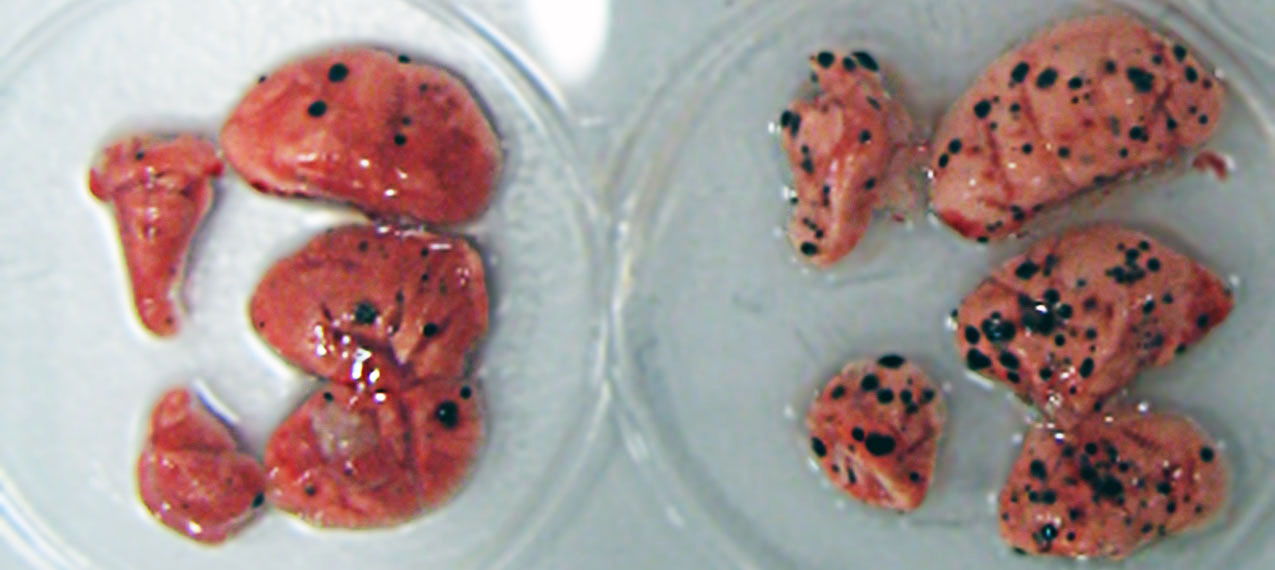New genes identified that regulate the spread of cancers

Research led by the Wellcome Trust Sanger Institute has discovered a new biological target for drugs to reduce the spread of tumours in cancer patients. Published in Nature today (11 January 2017), the study with genetically modified mice found 23 genes that are involved in regulating the spread of cancers. The researchers showed that targeting one of these genes – Spns2 – led to a three-quarters reduction in tumour spread.
The spread of tumours – metastasis – to other sites in the body is the leading cause of death for cancer patients. Up to 90 per cent of cancer deaths are due to this, however the process that regulates the spread of tumours is very poorly understood.
To find out what genes in the body could influence metastasis, the researchers looked at how tumours spread in genetically engineered mice that were missing specific single genes. They screened 810 unique genes and identified 23 genes that either increased or decreased the spread of skin tumour cells to the lungs. Many of these genes also caused an alteration in the immune system, such as changing the bodies’ ability to fight infection.
Removal of the Spns2 gene caused the largest change, reducing spread of tumours to the lungs by approximately four times. The researchers then looked at the effect of this gene on the spread of other cancers, from colon, lung and breast, and showed that taking out Spns2 also reduced the metastasis of these cancers.
“Loss of the Spns2 gene causes the greatest reduction in the formation of tumour colonies and represents a novel therapeutic target. We found that mice lacking Spns2 have a different ratio of immune system cells than normal, which seems to prime the immune system to remove cancer. Drugs that target this could help reduce or prevent the spread of tumours through the body.”
Dr David Adams from the Wellcome Trust Sanger Institute
Before this study The Spns2 gene was known to affect the immune system, but was not implicated in tumour spread. It codes for a protein that transports a lipid, S1P, which signals to the immune system. Without this transporter protein, the signaling doesn’t work properly and results in changes in the proportion of different immune cells in the body.
“This work supports the emerging area of immunotherapy, where the bodies’ own immune system is harnessed to fight cancer. Drugs could be designed to bind to the S1P transporter, preventing it from working and causing advantageous changes to the immune system. Investigation of further targets in the Spns2 pathway, or other targets identified in this study could help develop potential therapies.”
Dr Anneliese Speak from the Sanger Institute
“This study in mice gives a new insight into the genes that play a role in cancer spreading and may highlight a potential way to treat cancer in the future. Cancer that has spread is tough to treat, so research such as this is vital in the search for ways to tackle this process.”
Dr Justine Alford Cancer Research UK’s senior science information officer
More information
Funding:
This work was supported by Cancer Research UK and the Wellcome Trust.
Publications:
Selected websites
The Wellcome Trust Sanger
The Wellcome Trust Sanger Institute is one of the world’s leading genome centres. Through its ability to conduct research at scale, it is able to engage in bold and long-term exploratory projects that are designed to influence and empower medical science globally. Institute research findings, generated through its own research programmes and through its leading role in international consortia, are being used to develop new diagnostics and treatments for human disease.
Wellcome
Wellcome exists to improve health for everyone by helping great ideas to thrive. We’re a global charitable foundation, both politically and financially independent. We support scientists and researchers, take on big problems, fuel imaginations and spark debate.


